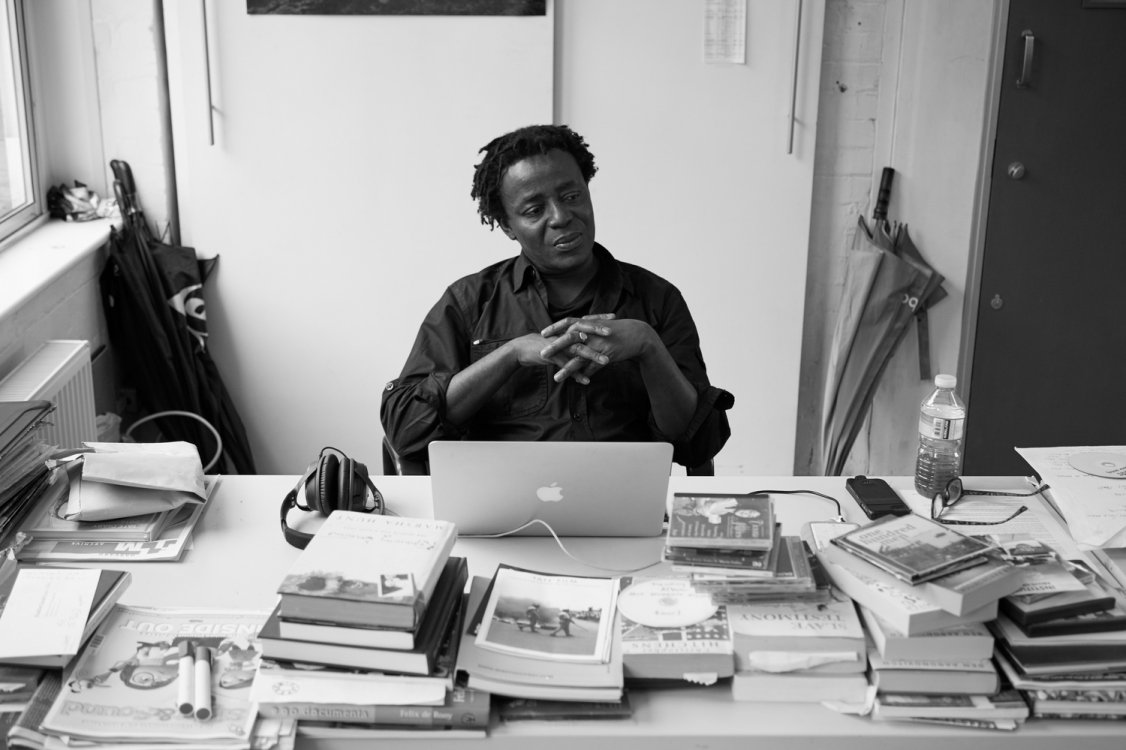

John Akomfrah
b. 1957, Accra, Ghana
Lives and works in London, UK
From the 1980s, British artist John Akomfrah has been one of the most influential practitioners of radical film. A founder of the Black Audio Film Collective, his aim was to mobilise self-reflection ‘to provide counter-narratives, to put on the table questions about identity and representation, cultural and aesthetic practices, to legitimise black identity ….’. Handsworth Songs (1986), the first film, broke new ground in its examination of the growing alarm and dissatisfaction of British ethnic minorities with an increasingly repressive social and political climate.
Akfomfrah has worked in different, often overlapping disciplines – as an artist (where his work is installed in a gallery), as a filmmaker (for cinema), and as a documentarist (for TV) – and is acutely aware that each ‘zone’ has its own codes, possibilities and audiences.
In Tropikos (2016), the work shown here, its languid, somnambulant action telescopes the 16th century origins of the British slave trade (between Western Africa, from where his family originates, and the New World) with present day realities of inequality and power. Rather than focusing on cruelty, Akomfrah emphasises nuance: whether ‘European’ or ‘African’, the costumed actors remain silent, and wander like ghosts across a British landscape that, at times, we are told is Africa, at others England. The sound, symbolism and presence of water pervades everything which, with the singing of whales, the chiming of clocks, the tolling of bells and the chanting of Tibetan monks, creates an audio-visual density, punctuated by short extracts of texts carefully chosen from Shakespeare (The Tempest, 1623) and Milton (Paradise Lost, 1667). This film’s melancholic, dream-like pace reveals the past as a bridge to the present within a mythic loop of the fall of humanity, the attractions and fears of otherness, and the appalling sadness of dislocation. Cultures meet but they are unable to empathise or communicate. Only an awakening can bring change. – DE
จอห์น อคัมฟราห์
เกิด พ.ศ. 2500, อัคครา, กานา
อาศัยและทำงานอยู่ที่ลอนดอน สหราชอาณาจักร
นับตั้งแต่ทศวรรษ 1980 เป็นต้นมา จอห์น อคัมฟราห์ ศิลปินชาวอังกฤษเป็นหนึ่งในผู้ประกอบการด้านภาพยนตร์หัวก้าวหน้าที่มีอิทธิพลมากที่สุด และเป็นผู้ก่อตั้ง Black Audio Film Collective โดยมุ่งขับเคลื่อนการสะท้อนตัวเอง “เล่าเรื่องเล่าตอบโต้ ตั้งคำถามเกี่ยวกับตัวตนและภาพแทน แนวปฏิบัติทางวัฒนธรรมและสุนทรียศาสตร์ ทำให้อัตลักษณ์ของคนผิวดำถูกต้อง….” ภาพยนตร์เรื่องแรกของเขา Handsworth Songs ในปี พ.ศ. 2529 ได้จุดประกายให้เกิดการตรวจสอบพิจารณาสัญญาณความไม่พอใจในบรรดาชนกลุ่มน้อยในจักรวรรดิบริติชที่เพิ่มมากขึ้นตามบรรยากาศทางสังคมและการเมืองที่บีบคั้นมากขึ้น
จอห์น ได้ทำงานในหลากหลายสาขาวิชาที่มีความทับซ้อนกัน ไม่ว่าจะเป็นในฐานะศิลปินซึ่งมีผลงานจัดแสดงในแกลเลอรี ผู้สร้างภาพยนตร์ หรือนักเขียนสารคดีสำหรับทีวี เขาจึงตระหนักดีว่า “โซน” แต่ละโซน มีรหัส ความเป็นไปได้และผู้ชมของตัวเอง
ในผลงานภาพยนตร์ Tropikos ในปี พ.ศ. 2559 ที่จัดแสดงในงานบางกอก อาร์ต เบียนนาเล่ 2020 พฤติกรรมที่ดูอ่อนเพลียและง่วงซึมได้ขมวดให้เห็นความทับซ้อนระหว่างต้นกำเนิดของการค้าทาสของจักรวรรดิบริติชในศตวรรษที่ 16 ระหว่างทวีปแอฟริกาฝั่งตะวันตกที่ครอบครัวเขาจากมากับทวีปอเมริกา กับความเป็นจริงของความไม่เท่าเทียมและอำนาจในปัจจุบัน โดยแทนที่จะมุ่งเน้นไปที่ความโหดร้าย จอห์นกลับเน้นความแตกต่างเล็กๆ น้อยๆ แทน กล่าวคือไม่ว่าจะเป็น "คนยุโรป" หรือ "คนแอฟริกัน" นักแสดงที่แต่งตัวสวยงามยังคงนิ่งเงียบและเดินเหมือนผีข้ามดินแดนของจักรวรรดิบริติช ซึ่งในบางครั้งเราถูกบอกว่าเป็นแอฟริกา แต่ในบางครั้งเรากลับถูกบอกว่าเป็นอังกฤษ เสียง สัญลักษณ์และการปรากฏของน้ำแผ่ซ่านอยู่ในสรรพสิ่ง สร้างความหนาแน่นของภาพและเสียงด้วยเสียงร้องของวาฬ เสียงนาฬิกาตีบอกเวลา เสียงตีระฆังและเสียงสวดมนต์ของพระทิเบต ซึ่งถูกคั่นด้วยการฉายข้อความสั้นๆ ที่คัดมาอย่างดีจาก เดอะ เทมเพสต์ (1623) ของวิลเลียม เชคสเปียร์ และ พาราไดซ์ ลอสท์ (1667) ของจอห์น มิลตัน การเดินเรื่องราวกับเดินผ่านฝันอันเศร้าโศกของภาพยนตร์ เผยให้เห็นอดีตที่เป็นสะพานเชื่อมสู่ปัจจุบันภายในวงเวียนแห่งการล่มสลายของมนุษยชาติ ความดึงดูดและความกลัวของความเป็นอื่น และความเศร้าโศกอันน่ากลัวของการเปลี่ยนแปลงแยกจาก วัฒนธรรมพบกันแต่ไม่สามารถเห็นอกเห็นใจหรือสื่อสารกันได้ ผู้ตื่นเท่านั้นที่สามารถนำมาซึ่งการเปลี่ยนแปลงได้